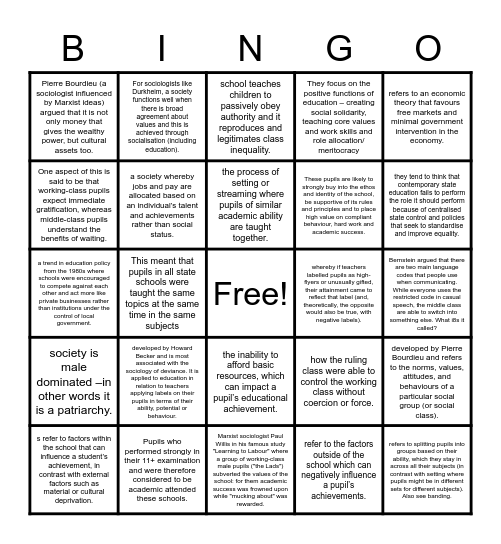

This bingo card has a free space and 24 words: developed by Howard Becker and is most associated with the sociology of deviance. It is applied to education in relation to teachers applying labels on their pupils in terms of their ability, potential or behaviour., Pupils who performed strongly in their 11+ examination and were therefore considered to be academic attended these schools., the process of setting or streaming where pupils of similar academic ability are taught together., s refer to factors within the school that can influence a student’s achievement, in contrast with external factors such as material or cultural deprivation., refers to an economic theory that favours free markets and minimal government intervention in the economy., Pierre Bourdieu (a sociologist influenced by Marxist ideas) argued that it is not only money that gives the wealthy power, but cultural assets too., One aspect of this is said to be that working-class pupils expect immediate gratification, whereas middle-class pupils understand the benefits of waiting., For sociologists like Durkheim, a society functions well when there is broad agreement about values and this is achieved through socialisation (including education)., whereby if teachers labelled pupils as high-flyers or unusually gifted, their attainment came to reflect that label (and, theoretically, the opposite would also be true, with negative labels)., the inability to afford basic resources, which can impact a pupil’s educational achievement., These pupils are likely to strongly buy into the ethos and identity of the school, be supportive of its rules and principles and to place high value on compliant behaviour, hard work and academic success., a trend in education policy from the 1980s where schools were encouraged to compete against each other and act more like private businesses rather than institutions under the control of local government., how the ruling class were able to control the working class without coercion or force., developed by Pierre Bourdieu and refers to the norms, values, attitudes, and behaviours of a particular social group (or social class)., a society whereby jobs and pay are allocated based on an individual’s talent and achievements rather than social status., refer to the factors outside of the school which can negatively influence a pupil’s achievements., Bernstein argued that there are two main language codes that people use when communicating. While everyone uses the restricted code in casual speech, the middle class are able to switch into something else. What i8s it called?, school teaches children to passively obey authority and it reproduces and legitimates class inequality., they tend to think that contemporary state education fails to perform the role it should perform because of centralised state control and policies that seek to standardise and improve equality., This meant that pupils in all state schools were taught the same topics at the same time in the same subjects, refers to splitting pupils into groups based on their ability, which they stay in across all their subjects (in contrast with setting where pupils might be in different sets for different subjects). Also see banding., society is male dominated –in other words it is a patriarchy., They focus on the positive functions of education – creating social solidarity, teaching core values and work skills and role allocation/ meritocracy and Marxist sociologist Paul Willis in his famous study "Learning to Labour" where a group of working-class male pupils ("the Lads") subverted the values of the school: for them academic success was frowned upon while "mucking about" was rewarded..
Arts Education in Schools Bingo | Arts Education in Schools Bingo | Chapter 6 | Level 2 HEALTH 1. | Educanese
Share this URL with your players:
For more control of your online game, create a clone of this card first.
Learn how to conduct a bingo game.
With players vying for a you'll have to call about __ items before someone wins. There's a __% chance that a lucky player would win after calling __ items.
Tip: If you want your game to last longer (on average), add more unique words/images to it.